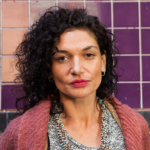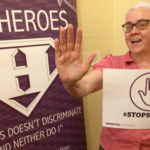Julie’s message to others…
If you feel confident enough and are in a position to talk about your experience of hep C you should. Normalising and busting stereotypes is an important conversation for us to have.
Lived Experience and Community Advocate
I am a HEP Hero because I feel it is important to raise awareness of the stigma and discrimination experienced by people who live or have lived with hepatitis. I believe people should not be discriminated against because they are sick.
In my experience individuals with hepatitis are frequently judged when they are asked to explain how they were exposed to the virus. There are still members of the community that feel uncomfortable about the virus and how it is contracted – this attitude can lead to stereotyping and belief that only particular types of person are infected with hepatitis C.
However the experience of hepatitis has many faces and many narratives. The way in which a person was exposed to the virus should not impact the way they are treated by the community and the medical field. There is still a lot of misinformed beliefs and fear about blood borne viruses but shunning people because of infection is not the answer.
The solution lies in being careful when dealing with all blood regardless of whether someone has hepatitis of not.
I have worked in the arts all my working life. I have 25 years experience working with communities on social justice projects. Because I have worked in these sectors I believe I am lucky to have avoided discrimination in all of my work places.
Currently I am a writer and artist. I exhibit my work regularly and this year a book of my photographs will be published by M.33. I am also a sessional lecturer for RMIT and a mother.
I found out I had Hep C in 1994 so I have had a lived experience of the virus for many decades.
I contracted hepatitis C either through experimenting with IV drug use or in 1985 when I had multiple blood tests with reusable needle in a Thai hospital. If I am asked about this, I have noticed that people’s reactions to me varies depending on the version I give. I would get sympathy for the Thailand experience and silence for the consequences of an unhappy past.
My personal experience alerted me to the fact there is still very little support for people struggling with this virus. I realised the level of stigma but also that people were scared to come out about their hepatitis diagnosis because of fear of discrimination both personally and in the work place – something people still struggle with today.
When I was diagnosed twenty six years ago, to help myself deal with the virus, I worked on the establishment of what is now Hepatitis Victoria in order to support other people living with hepatitis C. I have advocated for the rights of individuals with hepatitis by fighting for the initial funding for Hepatitis Victoria from the Victorian Health Department.
In 1994 I worked as a volunteer on a Hep C helpline which informed my understanding of the lived experience facing many people with the virus. The stories that people told me were the catalyst, and the content of my (pesky) fortnightly calls to the Head of Public Health when we were pressing the case for funding.
During this period I edited and rebranded the newsletter which I am pleased to see still called The Good Liver Magazine.
Recently I also took part in the Be Free From Hep C campaign to raise awareness for the new DAAs that had become available on the PBS and have been actively involved in Hepatitis Victoria.
It is my experience that hep C awareness groups are in a whole other league to other health promotion groups. They exhibit a sense of humanity while displaying an understanding of the complexities which underpin not only the experience of chronic illness but also stigma and discrimination.
If you feel confident enough and are in a position to talk about your experience of hep C you should. Normalising and busting stereotypes is an important conversation for us to have.
We acknowledge the traditional owners of the lands where we work - the lands of the Woi-Wurrung Wurundjeri people of the Kulin Nations. We express our gratitude to them for their continued care and curation of these lands and waters. We pay our respects to Elders past and present.
LiverWELL observes and honours the Kulin Nation's intrinsic connection to land, sky and water, and the creator Bunjil. LiverWELL is committed to being led and informed by Aboriginal and Torres Strait Islanders on bridging health outcomes for communities and improving liver health.



